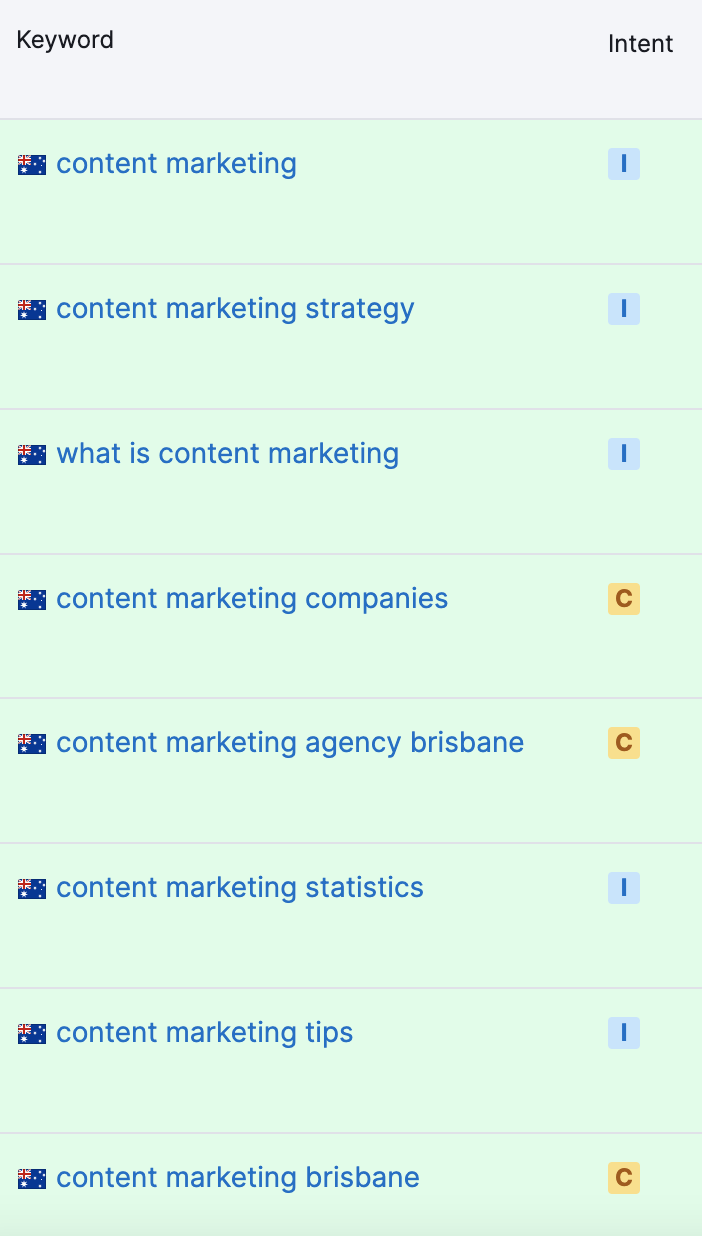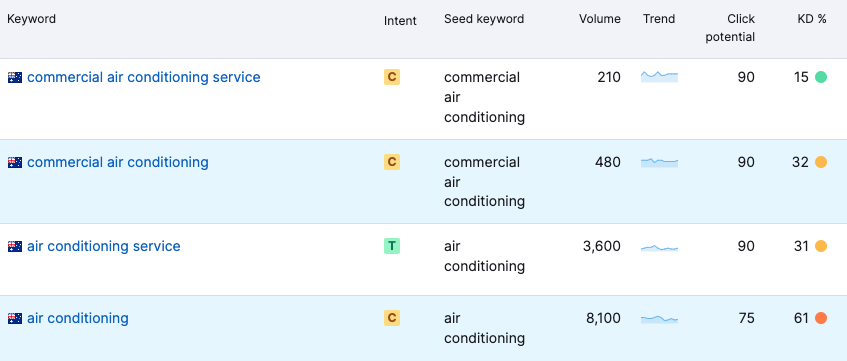Did you know that the keyword that someone types into Google tells you a lot about where that person is up to in the customer buying cycle?
Understanding where your customer is in the buying cycle enables you to serve them the most relevant content and information possible – to help them progress to the next step in the buying cycle. Having a strong keyword strategy that aligns the right keywords with the right content at the right time is important for maximising the success and ROI of your SEO campaigns.
The term ‘keyword intent’ refers to the underlying motivation or purpose that a user has when entering a specific query into a search engine. When choosing keywords to target in your SEO campaign, it is important to select your keywords strategically – ensuring that you have a range of keywords that align with your business and marketing goals.
As a Brisbane SEO company, keyword research and keyword strategy is a pivotal part of the SEO services that we provide clients with. Keyword research is the first step of establishing an SEO campaign – ensuring that our clients are empowered to make informed decisions about their keyword selection is important to us, and we work with them to make sure that they understand keyword intent and how it will affect their campaign’s performance.
In this article I’m going to explain the different types of keyword intent, and how they align with the different stages of the buyer decision making process. I’ll provide some examples of each category, and discuss the benefits of each keyword intent – including how each aligns with different marketing or business objectives.
I’ll also share some information around the importance of ensuring that your website content is designed to align with your keyword intent, and then at the end I’ll cover off some other considerations you’ll want to think about during keyword selection – including search volume and keyword difficulty.
The topics discussed in this piece assume a base level understanding of SEO and how Google’s algorithm works. If you need a quick reminder before you dive in, I recommend checking out some of my previous articles where I provide clear, easy to understand explanations of some key SEO concepts:
- SEO 101: Getting Started with Learning SEO
- How Long Does SEO Take? A Quick Explanation for a Long Process
- Beginners Guide to Understanding SEO
- Getting Started with SEO: The BeKonstructive Approach
If you’ve got any questions about BeKonstructive Marketing’s Brisbane SEO services, or would like more information about our SEO copywriting services, please get in touch or book a free SEO discovery session.
Keyword Strategy: How to Choose Keywords for Your SEO Campaign
When creating a new SEO campaign, it is tempting to simply select the keywords with the highest search volume. The higher the search volume, the more people coming to your website, the higher chances of gaining leads and sales – right?
Wrong.
While search volume is certainly an important factor to consider when choosing your keywords, it is not the only factor. If the only thing you’re looking for is search volume, then you are potentially missing out on some really high-value niche keywords that are not only easier to rank for but which also have a significantly higher conversion rate.
When choosing your keywords strategically, there are a number of factors that you need to consider including:
- Keyword Intent
- Keyword Difficulty
- Search Volume
Keyword intent is arguably the most important factor to consider because it directly aligns with your marketing and business goals.
Often when we talk to clients about why they are investing in an SEO campaign, and ask them what their goal is, they will reply ‘I want more organic traffic to my website’. But when we dig a little bit deeper – ask them why they want more traffic, and what actions they want that traffic to take – we discover that they actually have a more specific marketing goal that they are working towards.
For example “I want more website traffic because I want more people to register for my free online webinars” gives us a lot more insight into what keywords we should be targeting.
Or “I want more website traffic because I want more people to visit my cafe” tells me that the client actually wants more foot traffic for their physical business.
This is why we always start every new SEO services Brisbane project off with a free discovery and consultation session – to dig down and discover the client’s ultimate marketing goals, and ensure that we are aligning their keyword strategy with those goals.
Keyword Intent:
There are four main categories of keyword intent that we use when talking about SEO strategy. Below we have outlined each different type of keyword intent, how it aligns with the customer buying cycle, the pros/cons of each, and then some examples of keywords / phrases that fall into each category.
Information Intent
Overview: The user wants to find an answer to a specific question
Information intent keywords are used by people who are in the ‘research’ phase of the buying cycle.
They are considering whether they are going to invest in a product or service, and are looking at how the product or service will improve their life or business.
They are not ready to be ‘sold’ to – and presenting them with sales-focused content may actually put them off. They want clear, impartial information about the benefits, how it solves their problem, and whether the cost is worth the outcome.
Pros / Cons:
- Information intent keywords are great for businesses who want to improve their brand awareness.
- They are also ideal for businesses who have a lot of online resources like webinars, e-books, blog articles, and will help drive more users to these digital assets.
- Information intent keywords usually have high search volumes as well. Essentially, they are a great way to get your brand in front of a lot of people.
- The biggest drawback of information intent keywords is you are potentially playing a long-game here – if the customer is at the beginning of their research phase, it might be a few months before they are ready to commit or buy, especially with ‘big ticket’ items like a new car.
Information keywords usually have lower competition (keyword difficulty) levels than commercial and transactional keywords. This means it is easier to rank for them.
Content:
The best type of content to have on your website for information keywords is – you guessed it – informative content. Your blog articles and other online resources are likely going to target your information keywords.
- Content that answers a question for the audience without having a super-pushy sales pitch.
- Content that helps establish you as a thought leader within your industry by sharing your insights and knowledge.
A common marketing strategy is to use information keywords to drive users to your website, then have a lead-generation magnet like a free whitepaper or webinar that they have to sign-up to receive. You then feed their email address into your database to send a lead nurturing email campaign.
Example Keywords:
- Should I invest in SEO for my business?
- Benefits of using a professional accountant
- Electric cars vs petrol cars
- What does a commercial lawyer do?
- How do I choose a property manager?
- What insurance policies does my business need?
Commercial Intent Keywords:
Overview: The user wants to investigate brands or services
Commercial intent keywords are usually the step that follows on from ‘information’ intent keywords. If someone is typing a commercial intent keyword into Google, it usually means that they have decided to invest in a product or service – and they are now trying to decide which brand or business to engage with.
Pros / Cons:
We love commercial keywords because they indicate intent to buy! We no longer need to convince the user that they should engage a professional accountant for their business – because they have already come to that conclusion themselves.
Instead, we need to convince them that WE are the best professional accountant for them. That we are the most reliable, the most qualified, offer the most value for money etc.
The drawback of these keywords is that they are usually very competitive – which means that they are more difficult to rank organically for. Every accounting firm in Brisbane is going to be targeting ‘Brisbane accountants’, while only a few are going to be targeting information intent keywords like ‘accounting tips for Brisbane businesses’.
Content:
Commercial intent keywords are all about making your ‘sales’ pitch. These keywords should be assigned to your key sales landing pages where you explain your processes, your packages and pricing, and what you do better than everyone else (aka your USP).
Social proof like testimonials and case studies work great for these pages. As do free trials or offers – like our free SEO discovery session 😉
Keyword Examples:
- SEO Service Brisbane
- Australian Accounting Companies
- Brisbane Italian Restaurants
- Online SEO course
Transactional Intent Keywords:
Overview: The user wants to complete an action (conversion)
Transactional intent keywords are the final step in the buyer cycle – they have decided what they are going to buy, and they have decided who they are going to buy it from.
Transactional keywords will often align with your calls-to-action – they will include words like ‘buy’, ‘download’, ‘sign-up’, ‘join’ etc. They show an intent to take action immediately.
Pros / Cons:
These are the most valuable keywords because they have the highest conversion rate. Unfortunately – unless they are branded – these keywords are also the most competitive.
Content:
Someone has shown an intent to buy / commit / convert – you need to make it as easy, stress free and quick as possible for them to complete this action. The more difficult it becomes – the more hoops they have to jump through to finalise their action – the more likely you are to lose the sale / lead / conversion.
If they want to buy something – take them directly to the product page where they can add to cart and checkout. If they want to book or sign-up for something – the form to do so should be at the top of the page they land on. If they want to place an order, give them clear (and easy) instructions to do so.
Do not bog them down with a sales pitch, or give them answers to questions they haven’t asked – your ‘transaction’ intent user is on a mission to complete an action, and you need to make it your mission to make it as easy as possible for them to do so.
Keyword Examples:
- Any keyword that includes the word ‘buy’ – for example, ‘buy branded drink bottles’ or ‘buy accounting software’
- Book Melbourne hotel room
- iPhone 14 for sale
- Sign up to gym membership
- Enrol in online SEO course
- Order flower delivery today
- Buy women’s running shoes online
Navigational Intent Keywords:
Overview: The user wants to find a specific page, website, or business
Navigation intent keywords imply that the user already knows what they are looking for and are searching for a specific ‘thing’. For bricks-and-mortar businesses, the search phrase will usually include ‘near me’ – like ‘public library near me’. It might also include things like ‘Bunnings Warehouse store locator’.
For online business and services it might look more like ‘Facebook login’ or ‘Australia post tracking’. It can also include branded searches like ‘BeKonstructive Marketing website’.
Pros / Cons:
The biggest pro here is that they know what they want and they are likely going to go with the fastest and most convenient option available to them. People who type in ‘florist near me’ are not loyal to a specific brand or business – they have a need (for flowers), and they need to fulfil that need quickly. So if you are able to solve their problem, you are almost guaranteed the sale or conversion.
Content:
The content you serve people for navigational search terms should help them find you. For a bricks and mortar store, you’ll likely optimise your ‘contact us’ page for these search terms. The more information you have on your contact page that helps them find you quickly, the more likely you will be to gain them as a client.
- Information like a Google map, plus any helpful tips around the easiest way to get to you, or what the parking situation is will benefit you greatly.
- Your store opening hours, and information on how to get in touch with you outside of these hours.
- Images of your shop front so that they know what to look for when driving past etc.
Keyword Examples:
- Any keyword that includes ‘near me’ – like ‘Cafe near me’ or ‘acupuncture near me’
- Branded keywords like ‘BeKonstructive Marketing website’
- Keywords searching for the location of specific ‘tools’ like a login portal, a store locator etc.
Summary on Keyword Intent
To summarise and help you piece these ‘intents’ together, I’ve given you an example of three keywords – one for each of the main intent categories – that all relate to the same topic (SEO).
Information Intent: ‘SEO Benefits’
- Someone who types ‘SEO benefits’ into Google is in the research phase of the buyer cycle.
- They are interested in SEO, and want to know more about how it can benefit them and improve their business. They are not ready to buy.
- This is where we build goodwill and brand awareness with the user by providing them with great value content and answers to their questions. We help them see the long-term benefits of SEO – without being overly sales-y or pushy.
Commercial Intent: ‘SEO Companies’
- Someone who types ‘SEO companies’ into Google is in the commercial phase of the buyer cycle.
- They have decided that they want to give SEO a try for their business, and now they are looking for a company or service provider that they want to do business with.
- They are not ready to buy yet – but they will be soon.
- This is where we ‘pitch’ our services to the user. We explain to them what we do better than anyone else, and showcase our qualifications, previous results, and potential give them a free ‘taster’ or low-risk way to engage with us to see if we are a good fit.
Transaction Intent: BeKonstructive SEO Services
- Someone who types ‘BeKonstructive SEO services’ into Google is in the transactional phase of the buyer cycle.
- They are ready to commit – and we need to make it as quick, easy, and simple for them to do so as possible.
- This is where we are going to provide them with a booking form, or enable them to book themselves in for a free consultation / discovery session.
- We need to make sure that we are capturing their details, and that we have something ‘locked in’ with them so that they are committed to the next stage in our customer journey.
The Importance of Aligning Content with Keyword Intent
It is really important that you provide your users with the information that they are looking for when they land on your website. Failing to do so will result in a poor user experience, and your users will quickly flee your website.
Someone who has typed ‘should I buy an electric car’ into Google does not want to be taken to a Tesla product page that lists all of the features and benefits of a specific make and model. They want to know about the lifestyle, economic, and environmental benefits of electric vehicles over petrol or hybrid cars.
Someone who has typed ‘drive through coffee near me’ into Google doesn’t want to land on a page that describes how you source your coffee beans in great and excruciating detail. They want to get in their car without getting dressed and obtain a coffee as quickly as possible.
And someone who types ‘best Brisbane accountants’ wants to find an accountant that can help them manage their finances, they don’t want to be given advice on the best accounting software for small businesses.
The above is a selection of ‘information’ and ‘commercial’ intent keywords – indicated by the blue and yellow letters in the right hand column. All keywords relate to ‘content marketing’.
You can see that with the ‘information’ keywords, the user is searching for answers and information – what is content marketing, content marketing tips, content marketing strategy. They are investigating the benefits of content marketing – they are interested / intrigued by the potential of content marketing, but they have not made their mind up yet whether they want to invest in content marketing services.
With the ‘commercial’ intent keywords, you can see that they have moved beyond looking for answers and information and are now actively searching for a company to do business with.
If we try to sell to someone who is trying to find an answer to a question – they will become frustrated and leave the website. Likewise, if someone is trying to find a business to engage with, they will become frustrated if we are bogging them down with long-winded explanations of what content marketing is, and its benefits.
This is why it is important to ensure that you are serving the right content for the right keywords. Your content should align with the user’s intent – if they are looking for information, provide it, and if they are looking for a business to provide a service, explain to them why you are the best option.
Blog articles, research papers, explainer videos and podcasts are great for information based keywords. Your commercial keywords should be used for your landing pages, where you explain your processes, your pricing, and provide social proof (testimonials, case studies, outcomes etc). Your transactional keywords should land them on the pages where they can take action – book, buy, register, enquire etc. And your navigation keywords should either take them directly to the page that they are looking for (eg. login portal), or to a contact page that lists your address, opening hours, and contact information.
Keyword Strategy Considerations
Keyword intent is just one factor that you should be considering when selecting keywords to target for your SEO campaign.
There are two other considerations that you should be mindful of when selecting your campaign keywords.
Keyword Difficulty:
Keyword difficulty, often referred to as “KD”, is a metric used in SEO to determine how challenging it would be to rank on the first page of search engine results for a particular keyword.
It takes into account various factors including:
- The number of referring domains to the ranking pages
- The quality and relevance of content
- On-page SEO factors
- And user behaviour metrics
The higher the KD score, the more competitive the keyword is and, thus, the more challenging it will be to achieve top rankings. When selecting the keywords for your SEO campaign, we recommend that you select a variety of different keyword difficulty levels for a number of reasons.
Reasons to Have a Range of Easy, Medium, and Difficult Keywords:
Diversified Traffic Sources:
Just like a diversified investment portfolio reduces risk, having a mix of keyword difficulties ensures that you’re not putting all your eggs in one basket. If you only target high difficulty keywords, you might miss out on valuable traffic from easier keywords that your site could quickly rank for.
Quick Wins & Long-Term Goals: Easier keywords, with lower competition, often provide quicker results. While these might not bring massive traffic volumes, they can still provide valuable, targeted visitors. Difficult keywords, on the other hand, can be viewed as long-term goals due to the potentially high traffic and conversion benefits they can bring once you rank for them.
Building Domain Authority: By ranking for easier keywords first, you can gradually increase your website’s domain authority and trust in search engines. As your site becomes more authoritative, it will naturally have a better chance at ranking for medium and difficult keywords.
Understanding Your Audience: Different keywords represent different user intents. By targeting a range of keywords, you can tap into various stages of the customer journey. This helps in understanding your audience’s needs and behaviours better.
Balancing Effort and Reward: While difficult keywords often have higher search volumes and potential rewards, they also require a more substantial effort in terms of content, backlinks, and time. By also targeting easier keywords, you can achieve a balance between the effort you invest and the results you achieve.
Mitigating Algorithmic Changes: SEO landscapes are dynamic. Search engine algorithms update regularly. By diversifying your keyword strategy, you reduce the risk of traffic drops if a particular keyword gets affected by an algorithm change.
In summary, while high difficulty keywords might seem attractive due to their potential traffic volume, it’s essential for the success and sustainability of an SEO campaign to maintain a well-rounded keyword strategy. By incorporating a mix of easy, medium, and difficult keywords, you can optimise your opportunities for visibility, traffic, and conversions.
Search Volume:
Search volume is the average number of people who search for a particular keyword or phrase each month. The more niche a keyword is, the more likely it is to have a lower search volume. The broader a keyword is, the more likely it is to have a high search volume.
There are benefits to selecting keywords with high search volume – obviously, ranking for high search volume keywords means that you will potentially drive a lot more traffic to your website. The keyword difficulty for these keywords is usually a lot higher – meaning that it will take a lot more effort and resources to get you to the top of page 1 – but once there, you stand to gain a lot of search traffic and visitors to your website.
There are also benefits to selecting keywords with a low search volume – especially if they are highly relevant to your product / service, or if a single lead generated from that search term is very high-value.
An example of this is a client who we work with, Air-rite Solutions. Air-rite provides both commercial and residential air-conditioning and HVAC services. Keywords relating to residential air conditioning services have very high search volume and are very competitive, whereas keywords relating to commercial air conditioning tend to be a lot less competitive and have significantly less search volume.
BUT.
A commercial sale, lead or enquiry is a lot more valuable for our client. A commercial lead may entail a month-long project for their entire team, whereas a residential lead is equivalent to half a day’s work for one technician.
So this is an example where the importance of keyword strategy and keyword research really came into play. We were able to target low-search volume, low-competition keywords for Air-rite Solutions and gain significant results for their ROI because the leads they were getting were significantly more valuable than the residential leads – which were a lot more difficult to compete for.

Keyword data for commercial vs non-commercial air conditioning keywords. See that while the search volume is significantly higher for non-commercial keywords, the keyword difficulty score (KD%) is also twice as high.
This example really highlights why thinking strategically about keyword selection for your SEO campaign is so important – and why we don’t just automatically pick the keywords with the highest search volume.
Keyword Strategy Leads to SEO Campaign Success!
Phew – that was a lot of information to get through. I hope that this guide has given you some insight into how to select keywords for your SEO campaign, and given you enough knowledge to make informed decisions.
The key take-aways are:
- Think about the intent of the user – what information are they looking for when they type a particular keyword into Google
- Align your content with their intent – make sure you are optimising the right pages of your website for the right keywords
- Other keyword metrics like keyword difficulty and search volume should also be considered
- Spending some time at the start of your campaign to conduct thorough keyword research and select your campaign keywords strategically is a very important first step to ensuring the success and ROI of your SEO efforts!
If you would like any additional information about BeKonstructive Marketing’s Brisbane SEO services, please get in touch! You can also book a free SEO discovery session (where we discuss your keyword strategy in detail) as well as download a copy of our SEO packages and pricing here.











